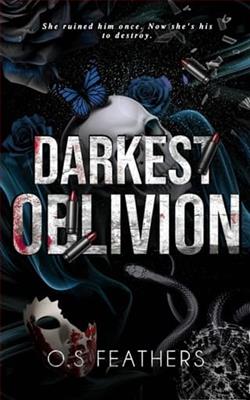Page 2 of The Business of Blood
“I only just arrived.” I scowled up at him, not appreciating the censure in his voice one bit. I didn’t know Agnes Sawyer, and she wasn’t acquainted with me. What possible comfort could I offer to her now? “She has her husband’s blood on her clothes and shoes. That’s evidence, isn’t it?”
“You could be all sorts of comfort to her, Fiona.” He leveled me with his most priestly look. “You understand exactly what she’s going through at this moment.”
“I didn’t know she was part of your congregation.” I crossed defensive arms over my chest, unwilling to open that door right now. “Or I’d have sent for you myself.”
“You would have known if you ever came to church. Sometimes, Fiona, I worry for your soul.” He cast me a damning look before he hurried toward the next door.
Aye, well. Sometimes, I worried for my soul, too. God knew I’d committed enough sins to procure my place in Hell.
Aidan went to the door next to the one in which I stood and held an urgent,sotto voceconversation with Constable Fanshaw. The lawman nodded, shook Aidan’s hand, and led the priest inside.
I watched Aidan’s features transform just before he disappeared into the gloom, sharp angles arranging from exasperation to compassion with practiced ease.
I drifted toward the threshold and eavesdropped, as I had naught to do until the body was conveyed to the coroner.
Agnes Sawyer hadn’t made so much as a peep until she saw Aidan.
After, her sobs could have roused the dead.
They say we Irish are cannier than most, that we are born with senses others don’t possess. Maybe that’s why I couldn’t bring myself to budge once Agnes Sawyer began to cry because I heard the melody of horror in her weeping. I felt the shock and terror, the grief and pain of stumbling upon a slaughtered loved one as though it were my own.
And it had been. More than once.
I pictured what must have occurred as Agnes Sawyer came home to find her husband displayed in such a ghastly way, his blood slowed to a mere trickle from what little remained of his neck.
When they say that blood is thicker than water, it’s valid in the most literal sense.
It’s more slippery, as well.
That’s likely why I noted the edge of the congealing puddle had been interrupted by the skid of a boot heel. Why Mr. Sawyer’s open collar and vest bore the crimson smears and stains of dainty fingers.
Because his wife had held desperate hands to his neck. She’d clutched at her dead husband, kneeling in his gore. Anyone with the slightest powers of observation would have taken one glance at the scene and known that Mr. Sawyer was beyond hope.
Shock and grief made loonies of us all.
Mrs. Sawyer made my job harder by doing what she did. She spread the blood about, painting a macabre portrait of motion with the bottom of her skirts. But I didn’t blame her a bit. I never did. During such a terrible mess, no one thought about who would have to clean it up later.
And why should they?
It had been my experience that most people couldn’t bring themselves to bear witness to what I do. Often, if they tried, they ended up hating through their gratitude. No one else wanted to be on their knees scouring up parts of their loved ones.
I attempted to remember sometimes, as I scrubbed the blood and offal from my hands, the exact, lamentable instant that the horrific became commonplace. Try as I might to pin the moment in effigy, like a lepidopterist would a butterfly to his board, I found it quite impossible.
Countless corpses rolled through my recollection with photographic detail. Except, unlike a photograph, these images contained the startling third dimension, as one would see through the scopes of a stereograph.
To say nothing of the other sensory reminiscences. The odors. The…tactile.
I asked myself: why bother with the gruesome carcasses of the past when there is a right grisly one just in front of me? And there would be others. Death’s business was a messy one.
And I made my living cleaning up after him. At least, here in London.
Aidan’s tall shadow knelt behind a flimsy partition separating one side of the tiny, pathetic room from the other. A lone lamp cast his shadow against it, along with the hunched form of poor Mrs. Sawyer, perched on the edge of a sparse bed. A cold cookstove hunkered in the corner, and I could barely make out a well-worn table protecting four mismatched dining chairs. Despite my unkind estimation of the place, it was one of the more comfortable lodging houses in this particular part of Whitechapel, in that it was a dwelling for a single family rather than a cupboard for countless thieves, immigrants, workmen, and prostitutes who would pay four pence for a vermin-ridden bed.
I listened to the hypnotic sympathy in Aidan’s voice. It seemed to calm the distraught woman. “Do you believe that your husband will meet God?” he asked gently. “That he’ll receive his just reward?”
“I do, Father.”
“As do I, Agnes. I believe it with all my heart and soul. Your husband’s suffering in this life has ended, and that can be its own blessing.”















